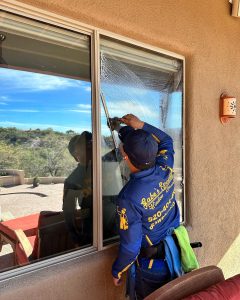Dear Future Window Cleaners: Don’t Fall For the “Quiet Quitting” Scam
“A professional is one who does his best work when he feels the least like working.” – Frank Lloyd Wright.
 It seems like any time I go on social media, some article or video promotes the concept of “Quiet Quitting.” It means different things to different people, but basically, the thought is to avoid doing more than what the job requires, only work within the defined hours of the job, and not invest emotion or energy into a job that will not reciprocate. Proponents use phrases like “acting your wage” or “work-to-rule” to express the idea of keeping work in its place to avoid burnout and make mental health a priority. Those who decry its popularity say that it encourages willful underperformance and slacking. Indeed, watch a few videos, and you will see a range of interpretations of its meaning.
It seems like any time I go on social media, some article or video promotes the concept of “Quiet Quitting.” It means different things to different people, but basically, the thought is to avoid doing more than what the job requires, only work within the defined hours of the job, and not invest emotion or energy into a job that will not reciprocate. Proponents use phrases like “acting your wage” or “work-to-rule” to express the idea of keeping work in its place to avoid burnout and make mental health a priority. Those who decry its popularity say that it encourages willful underperformance and slacking. Indeed, watch a few videos, and you will see a range of interpretations of its meaning.
Obviously, everyone has different goals, situations, and trajectories in life. I’m not saying that what I write in this article will be for or apply to everyone. Burnout and mental health concerns are real issues, and everyone has to learn how to manage their stress levels to the best of their ability. Not all jobs are the same; some may be legitimately terrible, bordering on exploitative. No one should tolerate abuse in any form. I am saying that if you have the goal of one day owning a window cleaning business, “Quiet Quitting,” in general, is a scam that will only push that goal further away from you. Here is why:
1) It robs you of opportunities to develop key skills you will need as a new business owner. Are you upset because you are working hard at a job for low pay? Then you will be disappointed running a new business for the first six months to a year. Tired of pouring energy into a job where no one appreciates you? Unless you look in the mirror each day and give yourself Stuart Smalley-style self-affirmations, few people in your life will have the experience to appreciate the exhaustion and stress a new business owner goes through. Much less express that appreciation. Do you hate to work longer hours than expected? Guess what is at the top of the job description of business ownership? You get the picture. My customer service skills, knowing how to treat my employees, and understanding what works and doesn’t work as a manager were all learned from my “dead-end” jobs. My dad gave me the best business advice I ever received after he listened to me complain about a fast-food job I had. He said, “Don’t do the work for them. Work for you. Invest in yourself.” You can’t invest in yourself by wasting opportunities to learn.
 2) It promotes the idea that you should withhold effort and energy until you are paid well. Often, I hear people say things like, “I’ll work hard when someone pays me enough to work hard.” They are implying that they will only work hard for people who appreciate their hard work, which should be expressed with an increase in pay. Well, in business, the CUSTOMERS are the ones writing your paychecks. Trust me; they aren’t going to pay premium money to an unproven commodity. You will have to earn a good reputation online and by word of mouth before you are monetarily appreciated for your skills. In the beginning, there will always be other cleaners in your area who can do a better job than you for a cheaper price. You may have to work for low wages, at least initially, until you improve your skills enough to warrant better pay. In business, hard work & quality comes BEFORE the raise in pay. You might as well learn how to do that in your current job.
2) It promotes the idea that you should withhold effort and energy until you are paid well. Often, I hear people say things like, “I’ll work hard when someone pays me enough to work hard.” They are implying that they will only work hard for people who appreciate their hard work, which should be expressed with an increase in pay. Well, in business, the CUSTOMERS are the ones writing your paychecks. Trust me; they aren’t going to pay premium money to an unproven commodity. You will have to earn a good reputation online and by word of mouth before you are monetarily appreciated for your skills. In the beginning, there will always be other cleaners in your area who can do a better job than you for a cheaper price. You may have to work for low wages, at least initially, until you improve your skills enough to warrant better pay. In business, hard work & quality comes BEFORE the raise in pay. You might as well learn how to do that in your current job.
3) It teaches you bad work habits that will be difficult to stop once you are on your own. There seems to be this unspoken belief that when you start your own business, by virtue of your investment in your company, you will magically become a hard-working, passionate, and responsible worker. Certainly, in the beginning, many new business owners are oozing excitement and enthusiasm for their new enterprise. How could they not? Everything is new, and they have finally achieved the dream of working for themselves. However, as the months go by and things settle down, the mundanity of business ownership starts to settle in. Who could imagine there was so much paperwork involved, so many non-moneymaking, tedious tasks that must be done? You thought it would be all window cleaning and cashing checks, but now you find a big chunk of running your business is… business. Well, guess what? There is no boss to tell you to get back to work. There is no manager to remind you of what essential tasks need to be done or when they need to be completed. It’s all you. If you have not developed the self-discipline, self-motivation, and organization skills to run a business BEFORE you run a business, you are going to struggle. That will not come automatically or easily. Start learning now.
 If you aspire to start a business one day, “Quiet Quitting” will flush months, even years, of valuable opportunities to invest in “you” down the drain. You may not realize or appreciate it while you are in it, but your “dead-end” job is actually a college of business ownership that pays you to attend. If you have a student’s mindset, you can learn customer service skills, business management (including what NOT to do), self-discipline, determination, the importance of company culture, and how to do your best work when you least feel like working. In other words, you will learn to be a professional. Frank Lloyd Wright would be so proud.
If you aspire to start a business one day, “Quiet Quitting” will flush months, even years, of valuable opportunities to invest in “you” down the drain. You may not realize or appreciate it while you are in it, but your “dead-end” job is actually a college of business ownership that pays you to attend. If you have a student’s mindset, you can learn customer service skills, business management (including what NOT to do), self-discipline, determination, the importance of company culture, and how to do your best work when you least feel like working. In other words, you will learn to be a professional. Frank Lloyd Wright would be so proud.
Gabriel Gutierrez

Very well written, and great thought process that business owners can share with employees. All true and not manipulative. It all makes perfect sense. Well done!
Good points here. I just can’t seem to wrap my head around the whole “quiet quitting” thing. Why not just quit and stop prolonging the agony of doing a job that you hate? Also, when you are hired to do a job, the employer expects that you are going to give your best and your pay is decided before you even start. So, if you feel like you’re not getting paid enough then why would you take the job in the first place?
You can definitely choose to look at it that way, but if you read the article it is talking specifically to window cleaners who are wanting to go out on their own. The point of the article is that the people who want to take advantage of “free enterprise” will learn the tools necessary to survive in jobs that others might consider a “dead-end”. No one is stopping them from going elsewhere. If they must be at a job, then work hard at it and learn from it.
Appreciate your principles but with today’s elitist and privileged attitude sound like you’re stopping people from progressing to become higher in the wages and expectation of life so given them a partnership,subcontracting ship, ultimate entrepreneurship or whatever ships” that will allow them to be free enterprise and free people and make as much money as possible sound like you’re trying to get as much work out of them as you can and make a profit in your own pocket, that’s just the way I see it.
Wc: Where did this article promote an “elitist and privileged attitude”? How did this article attempt to ‘stop people from progressing’ in their ability to earn?
Do you believe it’s acceptable for an employee to do the bare minimum to keep their job? Is that the type of employee you will hire into your company? If you have employees, or plan to, what will your expectations for their performance be based upon?
Well said. I learned the most from one of my worst jobs at 19 years old. Later when I started a printing business, I was able to apply this knowledge for the positive, no one knew I disliked that job at 19!
For me cleaning windows is therapy! No one wants our job, and they are happy to reward us with payment when we are finished.
I work just as hard for $1.25 a hour at 15 working in the car wash at 6.am to 6 pm Satuday and Sunday in 1968 as I do at 70 2023 but now with over 50 years of Knowledge and skill its a $100 a hour. The guys who get trained well might only make $30 a hour but the will make your $130 a hour . The work ethics is key! The ones who like getting you work and bidding offen start thre own business’s and all I say after traing lots and lots guys, more power to them ! Good for them! there is work for every one!